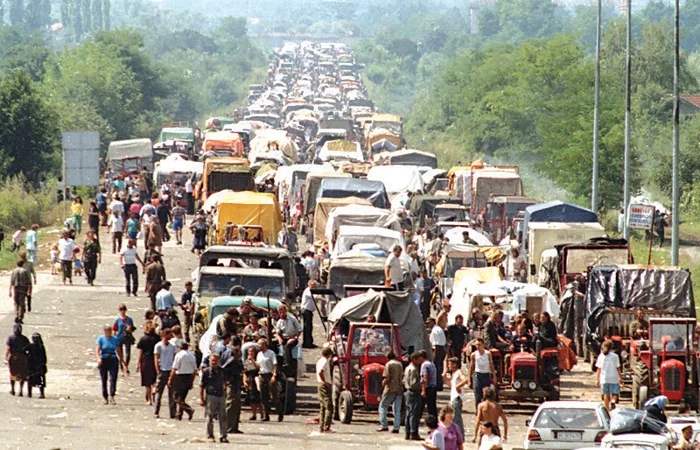The attack on Knin, 23 years ago, in the dawn of 4 August 1995, marked the beginning of the long prepared exodus of Serbs from Krajina. In the military-police operation of the Croatian “Storm” units, systematic crimes were committed against civilian population of Serb ethnicity and their property. In few days, around 250,000 people were evicted, mainly to Bosnia and Herzegovina, Serbia and other countries of former Yugoslavia, and thousands of houses and other facilities have been burned, while still large number of refugees are waiting for their return to the areas from which they were expelled. According to the Croatian Helsinki Committee for Human Rights data, by the end of 1995, about 400 Serbs who decided to stay in their homes were killed.
Today I remember the largest act of ethnic cleansing in the Yugoslav civil-wars: Operation Storm, a US-planned Croatian offensive that expelled approximately 300,000 Serbs from Croatia. Alas, the defeat of Nazism did not mark the end of ethnic cleansing in Europe. #OperacijaOluja
— Dr Marcus Papadopoulos (@DrMarcusP) August 4, 2019
“Storm” has remained a crime for which none has been so far criminally responsible. Namely, the International Criminal Tribunal for the former Yugoslavia (ICTY) sentenced general Ante Gotovina (commander of the Croatian Army and General Operations Commander of Operation Storm in the southern part of the Krajina region) to 24, and general Mladen Markac (Special Police of the Ministry of the Interior of the Republic of Croatia) to 18 years in prison. The verdict states that, together with several Croatian officials, including former President Franjo Tudjman, they participated in joint criminal actions, whose objective was the permanent removal of the Serbian population from Krajina area by force, spread of fear or threats of violence, persecutions, forced resettlement and deportation, seizure and destruction of property, etc. Following the appeal, in 2012 the ICTY aquited general Gotovina and Markac of individual criminal responsibility. This judgment has provoked a lot of controversy because the ICTY Trial Chamber and the ICTY Appeals Chamber – on the basis of the same facts and the same law – reached the diametrically opposite conclusions on the key issues raised by the prosecution and the defense during the trial. However, it is important to emphasize that these conclusions do not question the established facts about what actually happened during and after operation „Storm“.
For years now, in Montenegro and throughout the region, only civil society organizations and international experts have indicated that war crimes trials, which run before the courts of general jurisdiction, suffer from serious legal shortcomings and that the judiciary is governed by more political and less legal frameworks. Processing of war crimes must be non-selective, regardless of who is the perpetrator and who is the victim, because the crimes can not be justified or repressed as if they did not happen.
Podrška zemalja regiona ovoj inicijativi će se vrijednovati u sklopu političkih kriterijuma, odnosno privrženosti regionalnoj saradnji i dobrosusjedskim odnosima, kao što to i Strategija EK najavljuje. Ohrabruje i što su pojedine zemlje regiona iskazale i zvaničnu posvećeost ovoj inicijativi, poput Crne Gore, ali konkretni koraci tek predstoje.
Inadequate confrontation with the war past is still burdening the region, which is why in the last EC Strategy for the Western Balkans, the significance of reconciliation and regional co-operation is being emphasized. For the decade, civil society organizations in Montenegro and the region, which have formed the broadest regional coalition advocating for the establishment of RECOM, have been insisting on this. The support of the countries of the region to this initiative will be valued in the framework of political criteria, i.e. commitment to regional cooperation and good neighborly relations, as the EC Strategy announces. It is encouraging that certain countries of the region have expressed the official commitment to this initiative, such as Montenegro, but the concrete steps are yet to come.








